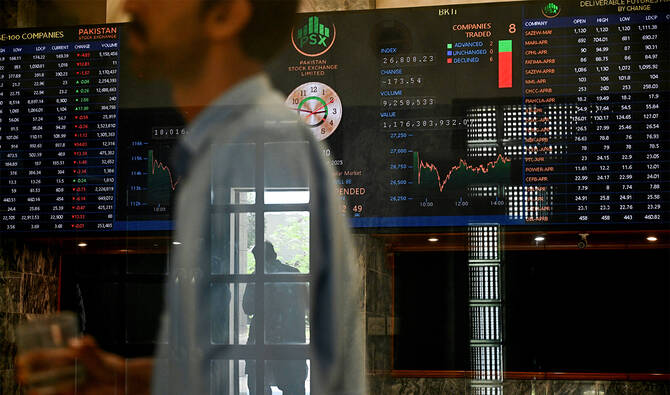KARACHI: Pakistan’s stocks and dollar-denominated bonds plunged in value on Thursday, which financial experts attributed to investor concerns over surging tensions between Islamabad and New Delhi.
Pakistan’s stocks shed two percent of their index value when the market closed on Thursday, as per data from the Pakistan Stock Exchange (PSX). The benchmark KSE-100 Index plummeted to 114,661 points but managed to recover some ground before closing at 115,019.81 points.
Pakistan’s dollar-denominated bonds maturing in 2036 also declined by more than four cents to 74 cents, international news agency Reuters reported, citing data from Tradeweb. Pakistani financial experts attributed the plunges to increasing investor concerns after renewed tensions between Islamabad and New Delhi.
New Delhi on Wednesday blamed Pakistan for being involved in an attack this week in Indian-administered Kashmir. Gunmen killed 26 men at a tourist site in the Anantnag district in Indian-administered Kashmir, following which India announced it was suspending its decades-old water-sharing treaty with Pakistan, among a raft of measures that included downgrading ties with Islamabad on Wednesday. Pakistan denied involvement in the attack and reciprocated with similar measures on Thursday.
“Both the KSE-100 and Nifty-50 are in the red today due to pressure from rising Pakistan-India tensions following the Pahalgam incident,” Najeeb Ahmed Khan Warsi, head of online trading at brokerage firm Foundation Securities Ltd., told Arab News.
The Nifty-50 is India’s National Stock Exchange index, representing the float-weighted average of the country’s 50 largest listed companies.
Warsi said investor sentiment remained “cautious” despite corporate earnings largely aligning with market expectations, noting that trading at Asian markets had also subdued with global recovery losing momentum amid uncertainty over the US–China tariff policy.
“Geopolitical and global economic concerns continue to overshadow market fundamentals,” he said.
Kamal Ahmed, an analyst at AKD Securities Ltd., said whenever border tensions arise, stock markets in both countries experience uncertainty. This prompts investors to take safer positions that impacts the market negatively.
“The market sentiment going forward will depend on how long this standoff lasts,” Ahmed explained. “Investors will remain cautious and the market could decline further if the situation escalates.”
Top brokerage firm Topline Securities said the plunge reflected “heightened investor caution.”
“Despite the risk-averse sentiment, overall participation remained firm with volumes clocking in at 505 million shares and a turnover of Rs24.44 billion ($87.94 million), underscoring continued investor engagement amid macro and geopolitical overhangs,” Topline Securities said in a statement.
Despite being supported by strong earnings, Pakistan’s stock index has lost 2.9 percent since Tuesday, when the attack took place. Pakistan’s stock market has been performing impressively, gaining more than 80 percent last year in both dollar and rupee terms. This surge was primarily driven by investor optimism surrounding a positive review by the International Monetary Fund, whose executive board is expected to approve a $1 billion tranche for Pakistan next month.
Further positive developments, such as global ratings agency Fitch recently upgrading Pakistan’s credit rating, are expected to support the growth of the country’s equities.
















